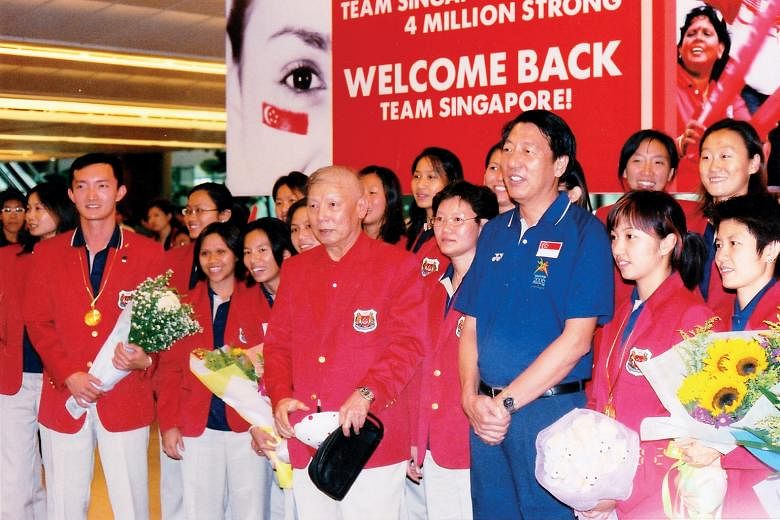The planet's best athletes are gathered at a world-famous sporting ground, the chilly Melbourne night thick with anticipation.
His body is sapped of strength and his legs are worn from the waiting. He tries his best to stay stoic, but knows his shivering hands are giving him away.
But Dr Tan Eng Liang, a member of Singapore's 1956 Olympic water polo team, is as bent on appearing at that opening ceremony as any athlete around him. He, too, had laboured and earned his right to be here.
Only this is 2006, the Commonwealth Games. Now he is here as chef de mission, not competitor.
This time, he is months from turning 69, bald from four rounds of chemotherapy just weeks before, ill from streams of toxic poison running through his body.

Give up? He does not know how.
-
Dr Tan's fulfilling life and milestones
-
Dr Tan Eng Liang was born on June 24, 1937, the youngest in a lower-middle class family of one girl and three boys. He gained entrance to Raffles Institution in 1952 and has led a rich life wearing many different hats.
AS AN ELITE ATHLETE
1956: Competed at the Melbourne Olympics as part of the water polo team. It is the only time Singapore has fielded a water polo team at the Olympics.
1958 and 1966: Competed at the Asian Games in Tokyo and later in Bangkok, winning silver medals at both Games.
1965 and 1967: Competed at the Southeast Asian Peninsular Games, the precursor to the SEA Games, winning the first two of Singapore's record 26 successive golds so far.
AS A SCHOLAR
1961: Became Singapore's first recipient of the prestigious Rhodes Scholarship (for Brunei, Malaya and Singapore) to further his studies at Oxford University, after graduating from the University of Malaya in Singapore with first class in chemistry.
May 1964: Obtained a DPhil in chemistry from Oxford. Tan also played water polo for the university, becoming the first Asian to be awarded a Half Blue in water polo in recognition of his contribution.
June 1964: Became a chemistry lecturer at the University of Malaya.
AS A POLITICIAN
1972: Unopposed in his first General Election, becoming Member of Parliament for River Valley.
1974: Appointed founding chairman of the Urban Redevelopment Authority.
1975: Appointed Senior Minister of State for National Development.
1978: Transferred to the Ministry of Finance.
1979: Relinquished Senior Minister of State position.
December 1980: Retired from Parliament.
AS A SPORTS ADMINISTRATOR
1975-1991: Served as chairman of the then-Singapore Sports Council for 16 years. Among the main issues he oversaw during his tenure were pushing for infrastructure and programmes that would help drive the Sport for All mandate; he also oversaw the building of the Singapore Indoor Stadium (1989).
1984 onwards: Led the Singapore contingent to the 1984 Los Angeles Olympics in his first outing as chef de mission. He would go on to lead 11 more contingents for a total of six SEA Games including the record-breaking one on home soil last year, two Commonwealth Games, two Asian Games and two Olympics.
1991 to present: Vice-president of the Singapore National Olympic Council.
Two years later, Dr Tan fights through rehabilitation to recover from heart surgery in time for the 2008 Olympics. But he falls at home 10 days before leaving for Beijing, suffering a slipped disc that leaves him with debilitating pain, unable to even lift his hands.
With a daily cocktail of painkillers, he wills himself through, but runs into urinary blockage issues just days later. Doctors prescribe more medication, advise surgery, and that the Olympics is a definite no-no. Tan counter-suggests urine drainage bags and even learns to insert a catheter into his own bladder - if that is what it takes to go. Thankfully, neither is required.
Quit? It is not in his DNA.
"Sometimes when I think back, I also think I'm mad," he tells The Sunday Times. "I just felt that I must finish the mission, that I want to do and finish my job.
"It's not fair if I just quit and get someone to take over. This is me, it's part of my character."
Now 79, Dr Tan's life has been driven by immense - perhaps even obstinate - responsibility and backed by resilience, built from a childhood that survived the torrid years of the Japanese Occupation.
Many will vouch for his character, but apart from Kathryn, his wife of almost five decades, few - not even his three children - would understand its genesis.
Even fewer would know how a kampung boy from Pasir Panjang, who taught himself to swim by throwing himself into the sea wearing trunks hand-sewn by his mother, would go on to become Singapore's first Rhodes scholar, the only Olympian elected to Parliament and one of the country's most experienced sports administrators.
They are stories Dr Tan is reticent about telling, unsure anyone would even be interested in them, but he has put them on record so his five grandchildren would know what Gong Gong has made of a life with - as he put it - simple beginnings and through them, learn life values for themselves.
In Simple Beginnings: Building a life of integrity, resilience and service, the autobiographical book he wrote with daughter Lynn and launched yesterday at UTown, he recounts a life he never planned for himself.
To him, credit is due to family and colleagues for believing in him and their support. But the ultimate "helping hand", for this Christian man, has come from above.
He said: "I never planned all of this, but I've been so fortunate. It's all been blessings and positive direction. When I was in university, all I was interested in was to get a degree, get a job, get married and get on with it.
"I never dared dream of any of these!"
By "these", he refers not just to making history with the prestigious scholarship he earned to Oxford. It is also the eight years spent in politics, helping to make decisions that literally changed the face of Singapore, and a successful career in the private sector.
In almost every facet and phase of his life, this water polo player has been thrown into the deep end.
But it is his stint as the founding chairman of the Urban Redevelopment Authority, beginning in 1974, that was the stiffest challenge. It meant making big decisions, involving land acquisition, redevelopment of areas like the central business district and resettlement - while being completely out of his element.
He recalled: "Urban redevelopment - that means you actually need to know something about urban planning. I'm not an architect, not a planner - I was a chemist!
"I (was) starting from zero, but it (was) a challenge. You either fall flat or you succeed - and for me there's no such thing as falling flat before you try."
But Dr Tan would also never take on a task he could not deliver.
He said: "I always have an inner confidence. When I take on a position, it's because I know I can contribute. If I'm not fully confident, I would not accept."
Despite being English-educated, he switches to Mandarin to explain why he entered politics: wei min fu wu. To serve the people.
It is why, even after leaving politics in 1980 - he said it was not his cup of tea - he continued a lifetime of service in his "first love" - sport.
It is where he has had the greatest satisfaction. Even after decades of involvement and a record 12 major Games as chef de mission, he still gets a rush like no other.
"I will continue until I drop dead, or when someone tells me I'm not wanted - and I will respect that. But before you tell me, I would've left anyway," he said, of a mantra he has always adhered to.
"Of course it's nice when people say thank you, or that you've done well, but I do it for my love of sports. When I do it for Singapore, I do it for Singapore. I couldn't care less about recognition.
"As far as I'm concerned, where I'm required, I will turn up."
Through chilly nights, illness and paralysing pain, with the same responsibility and resilience that defines this man.



